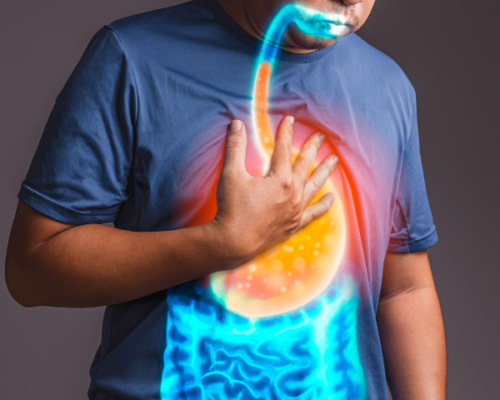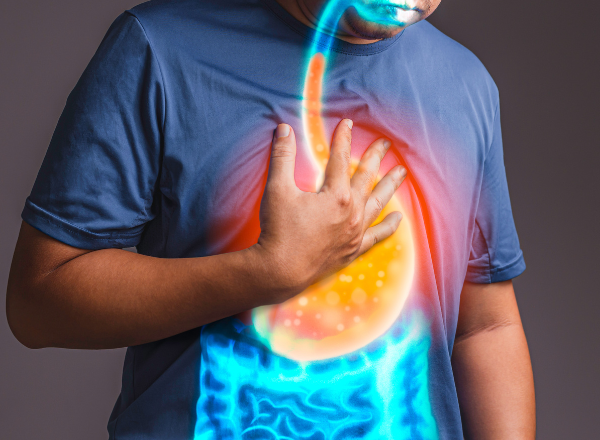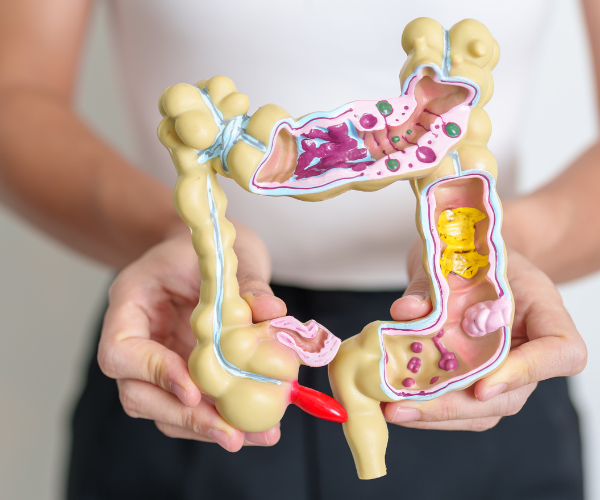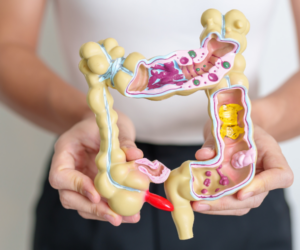Understanding indigestion symptoms and how to treat them
Discover the common symptoms of indigestion, what causes them, and how to find effective relief. Learn when it’s time to see a doctor for persistent discomfort.
Understanding indigestion symptoms and how to treat them
Discover the common symptoms of indigestion, what causes them, and how to find effective relief. Learn when it’s time to see a doctor for persistent discomfort.

Indigestion, also known as dyspepsia, is a common digestive issue that can cause discomfort after eating. It often manifests as bloating, nausea, heartburn, or a feeling of fullness, even after consuming small amounts of food. While occasional indigestion is not usually a cause for concern, persistent symptoms can interfere with daily life and may indicate an underlying health condition. Ignoring persistent indigestion or self-medicating without understanding the cause can lead to complications. Choosing the right treatment is essential for relief and long-term digestive health. Understanding the symptoms, causes, and available treatment options of indigestion can help manage discomfort effectively and prevent further digestive issues.
Indigestion, also known as dyspepsia, is a common digestive issue that can cause discomfort after eating. It often manifests as bloating, nausea, heartburn, or a feeling of fullness, even after consuming small amounts of food. While occasional indigestion is not usually a cause for concern, persistent symptoms can interfere with daily life and may indicate an underlying health condition. Ignoring persistent indigestion or self-medicating without understanding the cause can lead to complications. Choosing the right treatment is essential for relief and long-term digestive health. Understanding the symptoms, causes, and available treatment options of indigestion can help manage discomfort effectively and prevent further digestive issues.

Understanding indigestion
Common symptoms
Indigestion can present with symptoms, including a burning sensation or pain in the upper abdomen and acid reflux or heartburn.
Variability in symptoms
These symptoms can vary in intensity and may occur occasionally or persist over time, especially when treatment isn’t taken.
Dietary causes of indigestion
Indigestion is often caused by eating too quickly, consuming fatty or spicy foods, or excessive intake of caffeine and alcohol.
Other contributing factors
Other causes include stress, digestive disorders, or reactions to certain medications. In some cases, genetics may be involved.

Understanding indigestion
Common symptoms
Indigestion can present with symptoms, including a burning sensation or pain in the upper abdomen and acid reflux or heartburn.
Variability in symptoms
These symptoms can vary in intensity and may occur occasionally or persist over time, especially when treatment isn’t taken.
Dietary causes of indigestion
Indigestion is often caused by eating too quickly, consuming fatty or spicy foods, or excessive intake of caffeine and alcohol.
Other contributing factors
Other causes include stress, digestive disorders, or reactions to certain medications. In some cases, genetics may be involved.


Common causes of indigestion
Impact of diet on digestion
Fatty and acidic foods can irritate the digestive system and cause indigestion. Consuming too much caffeine or alcohol and eating too quickly can also contribute to discomfort.
Emotional health and digestion
In some instances, emotional health can significantly impact digestion. Stress and anxiety can slow down the digestive process, leading to bloating, nausea, and stomach pain.
Gastro-oesophageal reflux disease (GORD)
GORD causes stomach acid to flow back into the oesophagus, causing heartburn and indigestion. Chronic acid reflux can damage the oesophageal lining and require medical treatment.
Medications and lifestyle factors
Certain medications, including anti-inflammatory drugs, can cause indigestion as a side effect. Smoking and irregular eating patterns can also contribute to digestive discomfort.
Common causes of indigestion
Impact of diet on digestion
Fatty and acidic foods can irritate the digestive system and cause indigestion. Consuming too much caffeine or alcohol and eating too quickly can also contribute to discomfort.
Emotional health and digestion
In some instances, emotional health can significantly impact digestion. Stress and anxiety can slow down the digestive process, leading to bloating, nausea, and stomach pain.
Gastro-oesophageal reflux disease (GORD)
GORD causes stomach acid to flow back into the oesophagus, causing heartburn and indigestion. Chronic acid reflux can damage the oesophageal lining and require medical treatment.
Medications and lifestyle factors
Certain medications, including anti-inflammatory drugs, can cause indigestion as a side effect. Smoking and irregular eating patterns can also contribute to digestive discomfort.

Treatment options for indigestion
Medications for indigestion relief
Medication such as antacids helps neutralise stomach acid, H2 blockers reduce acid production, and proton pump inhibitors (PPIs) offer stronger acid-reducing effects for persistent symptoms.
Medications for severe indigestion
For more severe or persistent indigestion, a doctor may prescribe stronger medications, such as prescription-strength PPIs or prokinetics, which help the stomach empty more quickly.
Lifestyle changes to improve digestion
Eating smaller, more frequent meals, avoiding fatty and spicy foods, reducing caffeine and alcohol intake, staying hydrated, and managing stress can all support better digestion.
Natural remedies for mild indigestion
Certain natural remedies may help alleviate mild indigestion, including herbal teas like peppermint, probiotics to support gut health, and using a heat pack to relax stomach muscles.

Treatment options for indigestion
Medications for indigestion relief
Medication such as antacids helps neutralise stomach acid, H2 blockers reduce acid production, and proton pump inhibitors (PPIs) offer stronger acid-reducing effects for persistent symptoms.
Medications for severe indigestion
For more severe or persistent indigestion, a doctor may prescribe stronger medications, such as prescription-strength PPIs or prokinetics, which help the stomach empty more quickly.
Lifestyle changes to improve digestion
Eating smaller, more frequent meals, avoiding fatty and spicy foods, reducing caffeine and alcohol intake, staying hydrated, and managing stress can all support better digestion.
Natural remedies for mild indigestion
Certain natural remedies may help alleviate mild indigestion, including herbal teas like peppermint, probiotics to support gut health, and using a heat pack to relax stomach muscles.


When to seek medical attention
When indigestion signals an underlying condition
If indigestion occurs frequently or lasts for more than a few weeks, it may be a sign of an underlying condition such as GORD, ulcers, or infections.
Intense pain and its significance
Intense pain in the stomach or chest should not be ignored, as it could indicate ulcers or other serious conditions that require medical evaluation.
Unexplained weight loss and indigestion
If indigestion is accompanied by unexplained weight loss, it could signal a more severe digestive disorder that needs immediate medical attention.
Urgent symptoms to watch for
Difficulty swallowing or vomiting blood are symptoms that require urgent medical evaluation, as they may indicate conditions such as internal bleeding.
When to seek medical attention
When indigestion signals an underlying condition
If indigestion occurs frequently or lasts for more than a few weeks, it may be a sign of an underlying condition such as GORD, ulcers, or infections.
Intense pain and its significance
Intense pain in the stomach or chest should not be ignored, as it could indicate ulcers or other serious conditions that require medical evaluation.
Unexplained weight loss and indigestion
If indigestion is accompanied by unexplained weight loss, it could signal a more severe digestive disorder that needs immediate medical attention.
Urgent symptoms to watch for
Difficulty swallowing or vomiting blood are symptoms that require urgent medical evaluation, as they may indicate conditions such as internal bleeding.

Don’t let indigestion affect your daily life – find relief today
Indigestion can be more than just a minor inconvenience—it can interfere with your daily routine and overall well-being. While simple lifestyle changes and over-the-counter treatments may provide relief, persistent symptoms, like a burning sensation in the stomach, should not be ignored. If indigestion continues despite treatment, or if severe symptoms occur, seeking medical advice is essential to prevent complications.
Don’t let discomfort hold you back—speak to a healthcare professional today to identify the cause of your symptoms and get the right treatment for long-term relief.

Don’t let indigestion affect your daily life – find relief today
Indigestion can be more than just a minor inconvenience—it can interfere with your daily routine and overall well-being. While simple lifestyle changes and over-the-counter treatments may provide relief, persistent symptoms, like a burning sensation in the stomach, should not be ignored. If indigestion continues despite treatment, or if severe symptoms occur, seeking medical advice is essential to prevent complications.
Don’t let discomfort hold you back—speak to a healthcare professional today to identify the cause of your symptoms and get the right treatment for long-term relief.

FAQs
What are the most common symptoms of indigestion?
Indigestion commonly presents as bloating, nausea, heartburn, stomach pain, and excessive burping. Symptoms can vary depending on the cause.
Can stress cause indigestion?
Stress and anxiety can slow digestion and increase stomach acid production, leading to indigestion symptoms such as bloating and nausea.
What foods should I avoid if I have indigestion?
Foods high in fat, spice, and acidity, as well as caffeine, alcohol, and carbonated drinks, can trigger indigestion symptoms.
When should I see a doctor for indigestion?
If indigestion is persistent and accompanied by severe pain, unexplained weight loss, difficulty swallowing, or vomiting blood, it is important to seek medical attention promptly.
